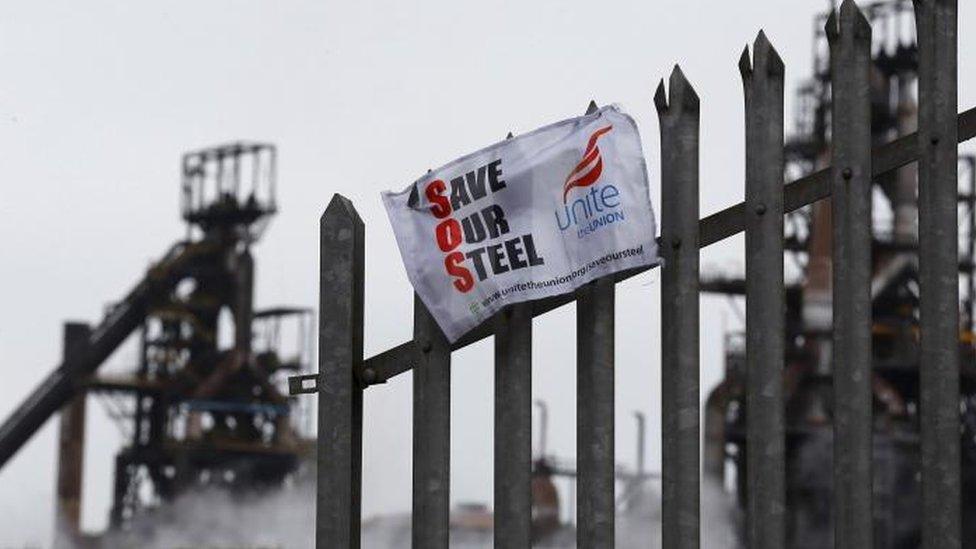Will the government part-nationalise Port Talbot?
- Published
- comments

The Business Secretary, Sajid Javid, rolled back the years yesterday when he seemed to allow the possibility of the part nationalisation of the UK steel industry by saying the government was prepared to "co-invest" with potential buyers of Tata's remaining business.
Not since the 1970s has the government owned a slice of a manufacturing industry and it runs contrary to every instinct of a Conservative government for the state to meddle in the free market. Shadow Business Secretary Angel Eagle in the Commons today referred to it as "ideological reluctance".
So how likely is it?
The government's line is that it remains "very unlikely" and Sajid Javid was not in the mood to elaborate during a Commons debate which was more political than business-focused. He said it wouldn't be prudent for the government to declare its hand before a buyer was found.
There are many ways the government can support a troubled company or industry.
It can guarantee loans which allow borrowing at lower rates, it can give tax reliefs as it has for the North Sea operators, or it can lend directly as in the case of Greybull Capital for investment in Scunthorpe.
This last option, say the Department for Business Innovation and Skills, is the government's preferred method of co-investing. (Worth noting, these loans have to be on commercial terms to avoid breaching EU state aid rules).
Taking an ownership stake in the business is a last resort, as it means pumping in money which has no repayment schedule.
But there it is - on the table.
Once that option is there, why would any buyer not want a chunk of money it may never have to pay back? The government may say it's unlikely, but given the scale of the problems facing Port Talbot wouldn't it become a pre-requisite?
Not necessarily. Having the government as a part-owner can be a headache for those running the business. With taxpayer money at stake, every decision is, quite rightly, scrutinised intensely.
Meetings with government officials can eat up time and energy better spent focused on running the business. The price you pay for government money is government bureaucracy.

At this point you may be screaming - but what about the banks?
The government nationalised Northern Rock and spent billions on massive stakes in Lloyds and RBS. That is perfectly true but, whether we like it or not, banks are different.
If Tata abandons Port Talbot, there will be thousands of redundancies but - elsewhere in the UK economy - life will go on. Wages will be paid, mortgages will be provided and cash points will work. In the case of the banks those fundamental economic functions were gravely threatened.
The banks could not have survived without government support, but that does not mean they have enjoyed having it as a shareholder. If you asked Stephen Hester, the former chief executive of RBS, how he found being perceived as a sock puppet on the government's hand I suspect the answer would be not much.
Whether the government takes a stake or not is not the most important issue. Any stake would be a minority one, which means that other investors would have to be found. For that to happen, you need a credible business plan. At the moment Port Talbot has attracted the interest of Liberty House's Sanjeev Gupta whose plan has been formulated, in his own words, on the back of an envelope.
Port Talbot needs a lot more than that. Once there is a plan, we can figure out who owns what later.
- Published11 April 2016
- Published7 April 2016